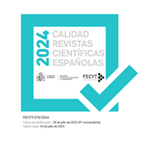Traditional Chinese Ritual Culture Transformed?: A TBC Approach to Joly’s and Hawkes’ Behaviour in Translating the Honorifics in Hong Lou Meng
Resumen
This article compares the treatment of honorifics in English translations of Hong Lou Meng by Henry Bencraft Joly, a British diplomat and David Hawkes, a British sinologist, in light of Translator Behaviour Criticism (TBC). The research adopts an integral method that starts with a textual analysis of the translator’s construal choices, then examines the translator’s behaviour pattern and finally his social motivations. The analysis has led to five major findings: 1) Joly’s version intended to preserve the traditional Chinese ritual culture contained in the honorifics and attached great importance to restoring the honorific function of the original address terms. 2) Joly tended to subscribe to the “truth-seeking” principle even at the cost of readability to maintain the original honorifics’ function. Nonetheless, in effect, he did it to translate and annotate a teaching material for British diplomatic interns, which led to the alignment of his “truth-seeking” behaviour with his “utility-attaining” pursuit. 3) Hawkes’ version, upholding the “utility-attaining” principle, established an addressing system adapted to the target readers’ cognitive habits with the social norms and family relations of the modern English world taken as background domain. He also made use of some creative translation strategies that had enhanced expressivity and influenced the characterization. 4) Hawkes’ “utility-attaining” behaviour is sustained by a “truth-seeking” basis because he aspired to reconstruct in modern English the literariness of the classic Chinese novel. 5) The different behaviours of the two translators demonstrated through construal choices in translating the honorifics in the novel conform to their respective social identities and professional habitus.
Descargas
Descarga artículo
Licencia
La revista Círculo de Lingüística Aplicada a la Comunicación, para fomentar el intercambio global del conocimiento, facilita el acceso sin restricciones a sus contenidos desde el momento de su publicación en la presente edición electrónica, y por eso es una revista de acceso abierto. Los originales publicados en esta revista son propiedad de la Universidad Complutense de Madrid y es obligatorio citar su procedencia en cualquier reproducción total o parcial. Todos los contenidos se distribuyen bajo una licencia de uso y distribución Creative Commons Reconocimiento 4.0 (CC BY 4.0). Esta circunstancia ha de hacerse constar expresamente de esta forma cuando sea necesario. Puede consultar la versión informativa y el texto legal de la licencia.











